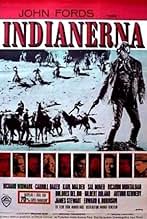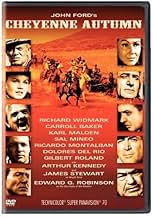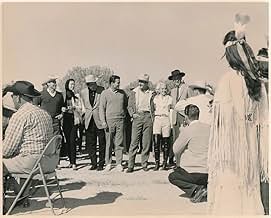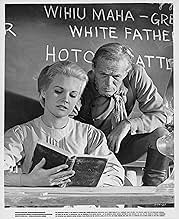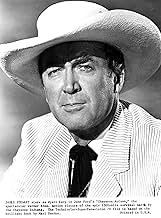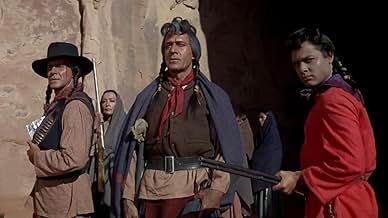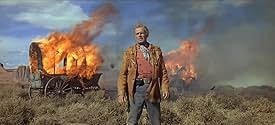I Cheyenne, stanchi delle promesse infrante del governo degli Stati Uniti, si dirigono verso le loro terre ancestrali ma un simpatico ufficiale di cavalleria ha il compito di riportarli nell... Leggi tuttoI Cheyenne, stanchi delle promesse infrante del governo degli Stati Uniti, si dirigono verso le loro terre ancestrali ma un simpatico ufficiale di cavalleria ha il compito di riportarli nella loro riserva.I Cheyenne, stanchi delle promesse infrante del governo degli Stati Uniti, si dirigono verso le loro terre ancestrali ma un simpatico ufficiale di cavalleria ha il compito di riportarli nella loro riserva.
- Regia
- Sceneggiatura
- Star
- Candidato a 1 Oscar
- 1 vittoria e 3 candidature totali
- Spanish Woman
- (as Dolores Del Rio)
- Guinevere Plantagenet
- (as Betty Ellen)
Recensioni in evidenza
This makes more sense, because most Ford Westerns, with perhaps the exception of "Stagecoach" and "Rio Grande" dealt relatively fairly with Indian characters. I don't think he had much to apologize for.
This movie is underrated by critics. I'm not sure why. I thought it compared favorably with his better work.
Here are the positives about the movie:
- It may be Ford's most beautiful film. He lingers in Monument Valley far longer than the logic of the script would dictate. He knew this would be that last time he would shoot there. The results are spectacular.
- The film has a stately, almost regal pace with an excellent accompanying soundtrack. This matches the pace of the central plot element – a six month journey by foot.
- It manages to never be dull. This is quite an accomplishment since there is no real hero, no real heavy and very little violent conflict. It's an example of very fine low key storytelling.
- Although this is a strong Indian point of view movie, it never becomes condescending or maudlin. Both sides are presented with respect and complexity.
- I've read much criticism of the Dodge City comic relief interlude. I thought this was fantastic segment. What a pleasure to see old pros like John Carradine, James Stewart and Arthur Kennedy do cameos in Ford's last Western. Ford understood the importance of inserting comic relief into Westerns, which are normally tense dramas in need of counterpoint. This is even more effective in the fundamentally somber "Cheyenne Autumn".
- Almost all strong Indian point of view movies are relentless downers that include no comic relief. For example, "Devil's Doorway", "Broken Arrow", "Dances With Wolves". Ford doesn't compromise on his traditional heavy use of humor in this movie and he also includes a somewhat optimistic ending. The ending may seem unrealistically positive, but it is actually at least partly rooted in historical accuracy, from what I've read. Of course, in the big historical picture there was no happy ending for the Indians. The question is: who wants to watch a movie that is that depressing? Ford strikes a good compromise here.
- Carol Baker is an underrated actress. She has a great screen presence and is very good in this film. Her character was very credible, if maybe a little too good looking. If she's a typical 1880's Quaker chick, I would have had to rethink my religious affiliation.
Now here are some things that kept the movie from being better:
- Widmark looks great, but I wish his character had been a more active player in plot developments. It's not best for the male lead to be too much of an observer. Also, he is way too old to be Carol Baker's romantic interest.
- The Indians are poorly cast with the use of mediocre Hispanic actors. I can't believe those weird bangs are authentic hairdos either. If they are, I would have invoked artistic license to change them.
- The subplot with the split between the Cheyenne leaders and the final confrontation at the end was poorly drawn, poorly acted and pointless.
- There are a few plot holes. The only one that really bothered me was the Cheyenne somehow managing to smuggle 20 rifles into their holding facility in the fort in Nebraska.
- Finally, this isn't really a fault, but I wanted to mention that I'm torn about Karl Malden's character.
On the one hand, it seems very odd to introduce a German officer who's oppressing the Cheyenne because "he's only following orders." Do we have to implicate the Germans in our genocide? Don't they have enough problems of their own on this issue?
On the other hand, I guess the point was to draw a comparison between the Holocaust and the destruction of the American Indian population. This was probably a very aggressive and controversial idea in 1964, for Americans anyway. The Germans I've known over the years never had a problem mentioning it to me. In fact, often they would talk of little else.
The rest of the long movie really disappoints. I tried to forgive the bad casting of Carroll as a Quaker, but she certainly didn't act like an unworldly woman. Karl Malden gave his usual intense, penetrating stare, but little else. Ricardo Montalban and the remarkably well-preserved Gilbert Roland play Native Americans; you'd think that by 1964 Hollywood would stop putting dark makeup on actors. Sal Mineo, also playing an Indian, strutted around with his shirt off to impress a tribal girl - but that made no sense, since Native Americans always ran around bare-chested. Why were there blushes and giggles exchanged? And randomly, there was a chunk of time in the middle of the movie that included Wyatt Earp (played by James Stewart) and Doc Holliday (played by Arthur Kennedy) in a saloon playing poker. They don't add to the story, and there's no acting required. Jimmy throws a few winks among his jokes, and Arthur keeps up. I can't imagine why this comic relief section was included in this drama. Edward G. Robinson also has a small role in the movie. Can't imagine him in a western? He plays a government official, so no cowboy hat for him. Keep an eye out for cutie pie Patrick Wayne, though, which is fun.
This movie is very long, and at times it does drag. The middle section is uneven, and after a while, you forget how the beginning even started. If you watch it, it won't hurt you, but it's not as good as it seems.
For some reason, Ford felt that Latino actors were appropriate for the roles of Native Americans, and Ricardo Montalban, Gilbert Roland, and Dolores del Rio do achieve a measure of dignity as members of the long-suffering Cheyenne tribe. While Carroll Baker tries hard as a Quaker woman who accompanies the Cheyenne on an arduous trek back to their homeland, her bleached blonde hair, immaculate make-up, and voice undercut her efforts. The work of composer, Alex North, also sounds out of place. Best known for his scores for "Spartacus" and "Cleopatra," North's music here evokes Roman legions rather than the U.S. cavalry.
However, the biggest flaw in the film is a misconceived episode in the middle that features James Stewart, Arthur Kennedy, and John Carradine. As Wyatt Earp and Doc Holliday, Stewart and Kennedy perform a comedy routine that jars with the solemnity of the previous scenes. Indeed, the entire Dodge City sequence is a western comedy, and viewers would be justified in thinking that some film reels were mislabeled and an entire sequence from another film had been inserted accidentally. Whatever dignity and concern was established in the film's first hour are destroyed when the action moves from the Cheyenne to Earp and Dodge City.
"Cheyenne Autumn" was likely conceived as a follow-up to the successful "How the West Was Won." John Ford was one of the directors of that Cinerama film; Carroll Baker, Karl Malden, James Stewart, and Richard Widmark are featured in both films; and the ads for the two westerns are strikingly similar. Widmark anchors "Cheyenne Autumn" and provides a narration much as Spencer Tracey did for "How the West Was Won." However, the earlier movie was a rousing adventure with a great score and an uplifting theme of westward expansion. Despite an overture and intermission, "Cheyenne Autumn" is a small, sober tale of racial injustice that has been stretched out and embellished with a jarring music score and a schizophrenic mix of comedy and tragedy that lays waste to some fine epic moments.
Compared with other western movies, the main difference and innovation is that here any killed man is a REAL tragedy, that exhaustion, famine, cold, violence are REAL sufferings for the miserable people on the screen (not just for the Cheyennes, even for the whites). And all that is shown us by Ford ruthlessly, uncompromisingly. The fact that the director stands for the Indians is not as much innovative as it seems. All along his career Ford showed respect and sympathy for them. In the finale, just after an apparent happy ending, we have again violence, again a murder, again a distressed mother: we almost feel the same grief of hers. It is somewhat ironic that in the same year the film was made, 1964, the fashion of Italian western movies invaded the world of cinema, with furious, acrobatic gun-fights and hundreds of shot-dead people, like in a sort of funny game.
The movie is split into two parts by a comic interlude, the episode placed in Dodge City, which is actually a farce. I think that Ford wanted to pay a homage and bid his personal farewell to the old silent western-movies of the 1920s, when his career started. The funny situations are deliberately over the top: see the sensational, licentious joke, when Wyatt Earp (Jimmy Stewart) realizes that he actually had met the girl in Wichita... In any case, a somewhat gloomy mood permeates even this comic part. The main characters are all aged, grey-haired and seemingly life-weary. And the episode is introduced by a particularly brutal, cruel murder.
I think that "Cheyenne Autumn" is a beautiful film, with a good story, great visual beauties, and, in particular, an excellent acting by the whole cast. But it is tough for me to face John Ford's desperate vision. After all, what I most like in the movie is to see, once again, Ben Johnson and Harry Carey Jr on horse-back, in their blue uniforms (by the way: why are they uncredited?). They are both aged and bulkier compared with their look in the great Ford's western-epics of their youth. Never mind: they are almost dearer to me for this very reason...
Lo sapevi?
- BlooperThe language used by the Cheyenne in this movie is not Cheyenne. It is Navajo. Cheyenne is an Algonquian language, whereas Navajo is Athabaskan (Na Dene), and they do not sound even remotely similar. This is explainable, however, by the fact that this film was shot on the Navajo Nation.
- Citazioni
Secretary of the Interior: Oh, Henry... you and I fought together at Gettysburg. You had never seen a Negro slave. All you ever knew was that they were human beings with the rights of human beings - and it was worth an arm to you.
- Versioni alternativeMany television prints run 145 minutes, and omit the scene with James Stewart as Wyatt Earp. The video release is the full 154-minute version.
- ConnessioniEdited into Film socialisme (2010)
I più visti
- How long is Cheyenne Autumn?Powered by Alexa
Dettagli
Botteghino
- Budget
- 4.200.000 USD (previsto)
- Lordo in tutto il mondo
- 10.980 USD
- Tempo di esecuzione2 ore 34 minuti
- Proporzioni
- 2.20 : 1
Contribuisci a questa pagina




